Volkswagen's Ethical Issues and Management Theory Analysis
VerifiedAdded on 2020/05/11
|15
|4118
|57
Essay
AI Summary
This essay examines the ethical issues faced by Volkswagen, focusing on the emission scandal and its impact on the company's reputation and financial standing. The essay details how Volkswagen's pursuit of market leadership and aggressive business objectives led to the installation of cheating software in their diesel vehicles to pass emission tests, violating environmental regulations and misleading consumers. The essay then applies various ethical theories, including rule-based/utilitarian, justice-based, and virtue-based ethics, to analyze the ethical dilemma faced by Volkswagen. It critically evaluates the company's actions, highlighting the corporate malpractices and the failure of leadership in providing ethical guidance. The essay concludes that Volkswagen's decisions were unethical and did not align with any of the discussed ethical principles, emphasizing the importance of ethical decision-making in business.
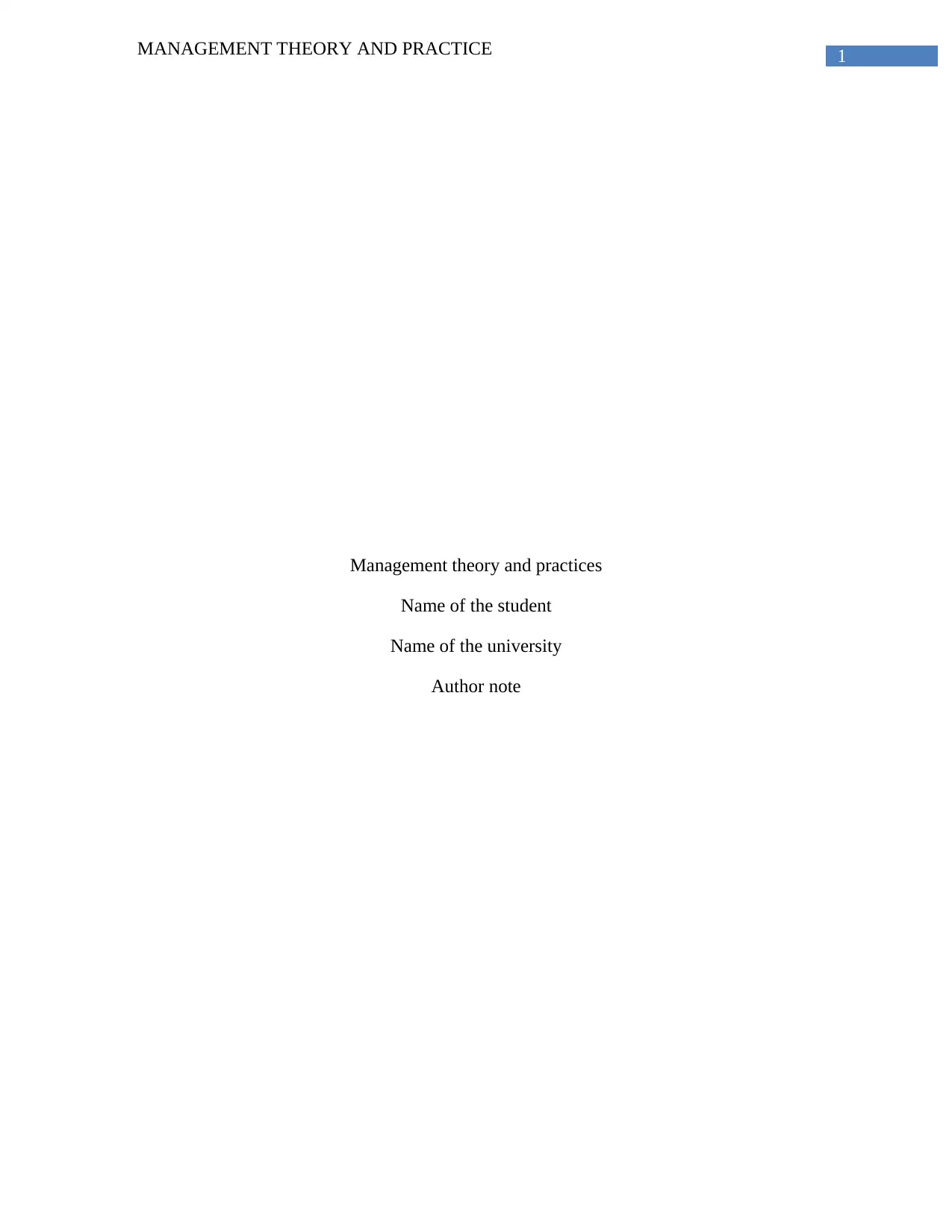
1MANAGEMENT THEORY AND PRACTICE
Management theory and practices
Name of the student
Name of the university
Author note
Management theory and practices
Name of the student
Name of the university
Author note
Paraphrase This Document
Need a fresh take? Get an instant paraphrase of this document with our AI Paraphraser
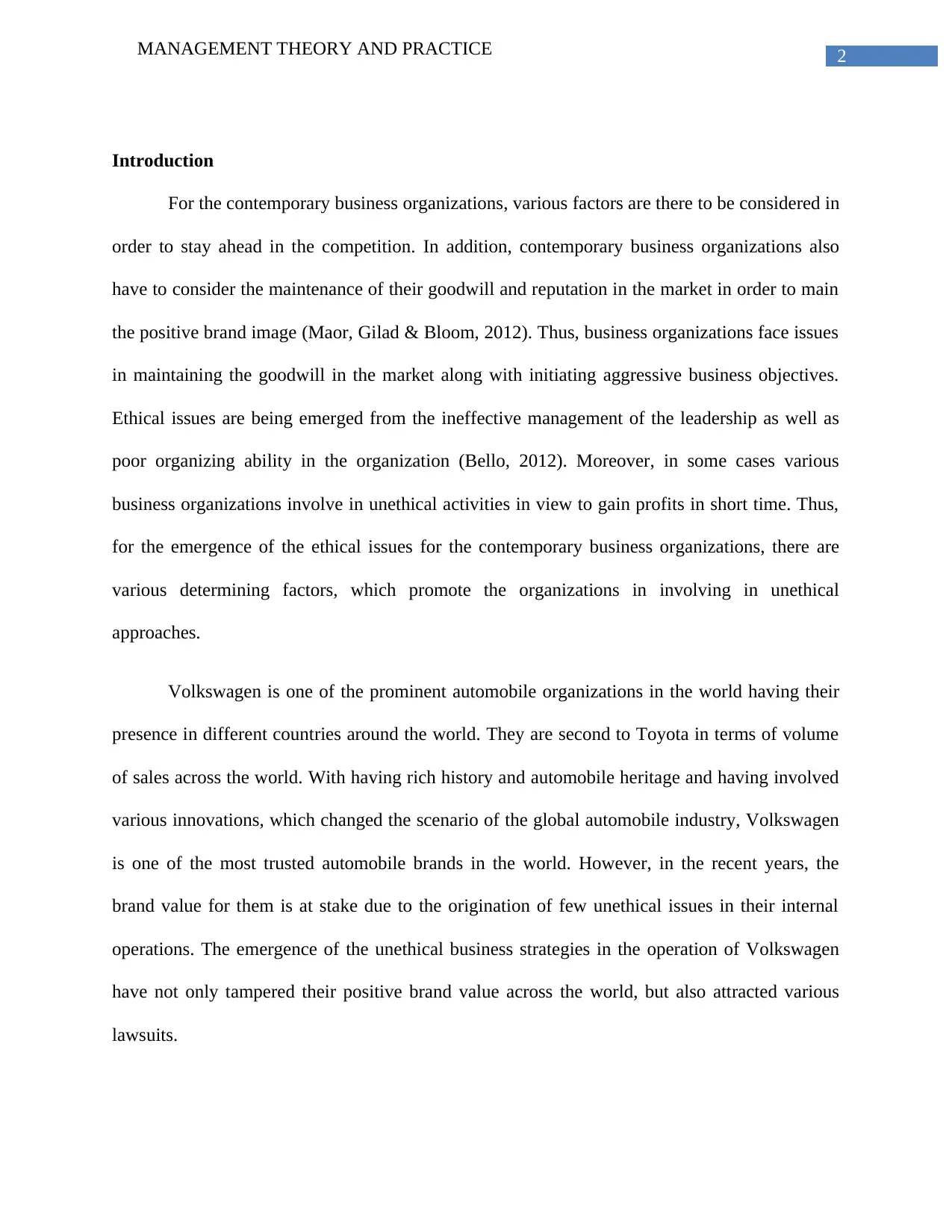
2MANAGEMENT THEORY AND PRACTICE
Introduction
For the contemporary business organizations, various factors are there to be considered in
order to stay ahead in the competition. In addition, contemporary business organizations also
have to consider the maintenance of their goodwill and reputation in the market in order to main
the positive brand image (Maor, Gilad & Bloom, 2012). Thus, business organizations face issues
in maintaining the goodwill in the market along with initiating aggressive business objectives.
Ethical issues are being emerged from the ineffective management of the leadership as well as
poor organizing ability in the organization (Bello, 2012). Moreover, in some cases various
business organizations involve in unethical activities in view to gain profits in short time. Thus,
for the emergence of the ethical issues for the contemporary business organizations, there are
various determining factors, which promote the organizations in involving in unethical
approaches.
Volkswagen is one of the prominent automobile organizations in the world having their
presence in different countries around the world. They are second to Toyota in terms of volume
of sales across the world. With having rich history and automobile heritage and having involved
various innovations, which changed the scenario of the global automobile industry, Volkswagen
is one of the most trusted automobile brands in the world. However, in the recent years, the
brand value for them is at stake due to the origination of few unethical issues in their internal
operations. The emergence of the unethical business strategies in the operation of Volkswagen
have not only tampered their positive brand value across the world, but also attracted various
lawsuits.
Introduction
For the contemporary business organizations, various factors are there to be considered in
order to stay ahead in the competition. In addition, contemporary business organizations also
have to consider the maintenance of their goodwill and reputation in the market in order to main
the positive brand image (Maor, Gilad & Bloom, 2012). Thus, business organizations face issues
in maintaining the goodwill in the market along with initiating aggressive business objectives.
Ethical issues are being emerged from the ineffective management of the leadership as well as
poor organizing ability in the organization (Bello, 2012). Moreover, in some cases various
business organizations involve in unethical activities in view to gain profits in short time. Thus,
for the emergence of the ethical issues for the contemporary business organizations, there are
various determining factors, which promote the organizations in involving in unethical
approaches.
Volkswagen is one of the prominent automobile organizations in the world having their
presence in different countries around the world. They are second to Toyota in terms of volume
of sales across the world. With having rich history and automobile heritage and having involved
various innovations, which changed the scenario of the global automobile industry, Volkswagen
is one of the most trusted automobile brands in the world. However, in the recent years, the
brand value for them is at stake due to the origination of few unethical issues in their internal
operations. The emergence of the unethical business strategies in the operation of Volkswagen
have not only tampered their positive brand value across the world, but also attracted various
lawsuits.
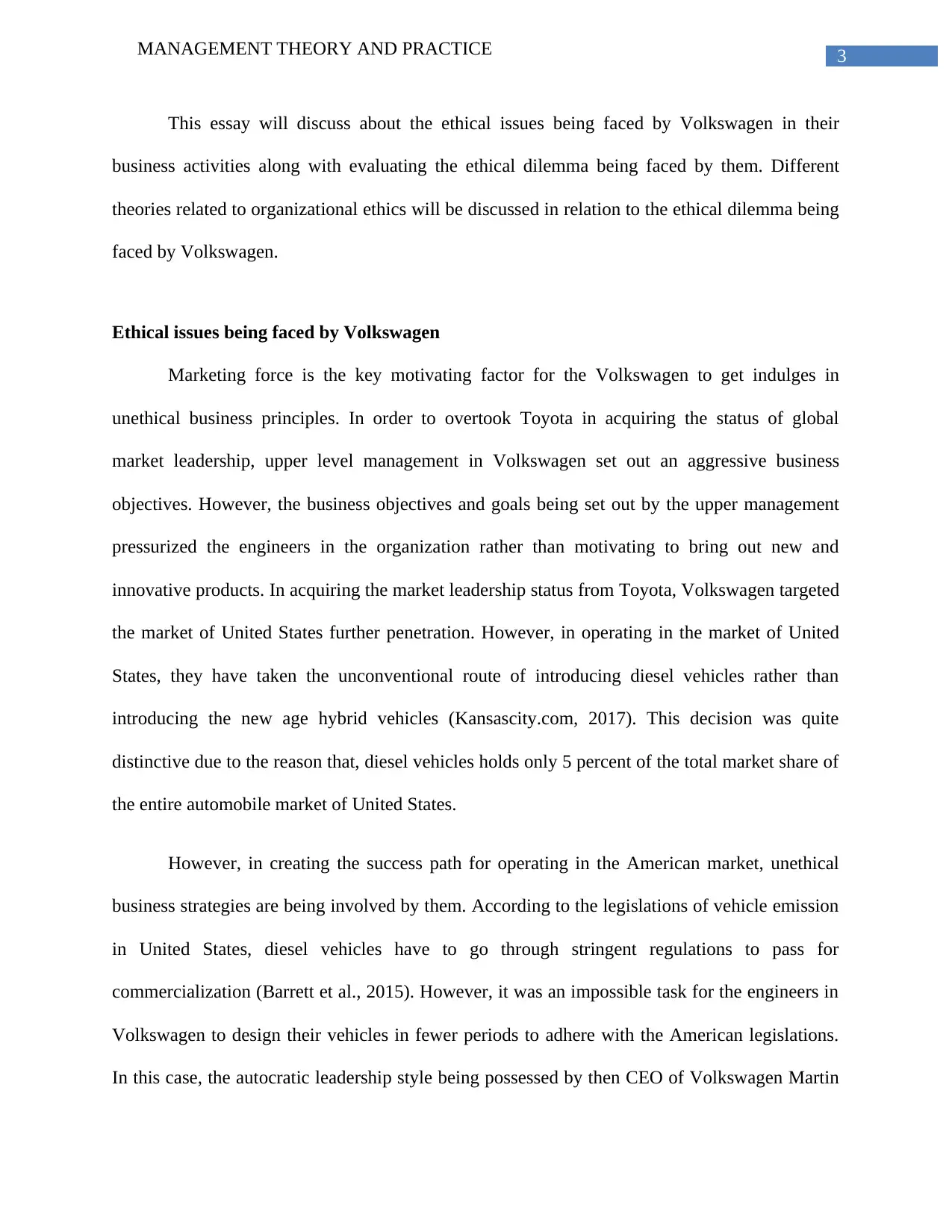
3MANAGEMENT THEORY AND PRACTICE
This essay will discuss about the ethical issues being faced by Volkswagen in their
business activities along with evaluating the ethical dilemma being faced by them. Different
theories related to organizational ethics will be discussed in relation to the ethical dilemma being
faced by Volkswagen.
Ethical issues being faced by Volkswagen
Marketing force is the key motivating factor for the Volkswagen to get indulges in
unethical business principles. In order to overtook Toyota in acquiring the status of global
market leadership, upper level management in Volkswagen set out an aggressive business
objectives. However, the business objectives and goals being set out by the upper management
pressurized the engineers in the organization rather than motivating to bring out new and
innovative products. In acquiring the market leadership status from Toyota, Volkswagen targeted
the market of United States further penetration. However, in operating in the market of United
States, they have taken the unconventional route of introducing diesel vehicles rather than
introducing the new age hybrid vehicles (Kansascity.com, 2017). This decision was quite
distinctive due to the reason that, diesel vehicles holds only 5 percent of the total market share of
the entire automobile market of United States.
However, in creating the success path for operating in the American market, unethical
business strategies are being involved by them. According to the legislations of vehicle emission
in United States, diesel vehicles have to go through stringent regulations to pass for
commercialization (Barrett et al., 2015). However, it was an impossible task for the engineers in
Volkswagen to design their vehicles in fewer periods to adhere with the American legislations.
In this case, the autocratic leadership style being possessed by then CEO of Volkswagen Martin
This essay will discuss about the ethical issues being faced by Volkswagen in their
business activities along with evaluating the ethical dilemma being faced by them. Different
theories related to organizational ethics will be discussed in relation to the ethical dilemma being
faced by Volkswagen.
Ethical issues being faced by Volkswagen
Marketing force is the key motivating factor for the Volkswagen to get indulges in
unethical business principles. In order to overtook Toyota in acquiring the status of global
market leadership, upper level management in Volkswagen set out an aggressive business
objectives. However, the business objectives and goals being set out by the upper management
pressurized the engineers in the organization rather than motivating to bring out new and
innovative products. In acquiring the market leadership status from Toyota, Volkswagen targeted
the market of United States further penetration. However, in operating in the market of United
States, they have taken the unconventional route of introducing diesel vehicles rather than
introducing the new age hybrid vehicles (Kansascity.com, 2017). This decision was quite
distinctive due to the reason that, diesel vehicles holds only 5 percent of the total market share of
the entire automobile market of United States.
However, in creating the success path for operating in the American market, unethical
business strategies are being involved by them. According to the legislations of vehicle emission
in United States, diesel vehicles have to go through stringent regulations to pass for
commercialization (Barrett et al., 2015). However, it was an impossible task for the engineers in
Volkswagen to design their vehicles in fewer periods to adhere with the American legislations.
In this case, the autocratic leadership style being possessed by then CEO of Volkswagen Martin
⊘ This is a preview!⊘
Do you want full access?
Subscribe today to unlock all pages.

Trusted by 1+ million students worldwide
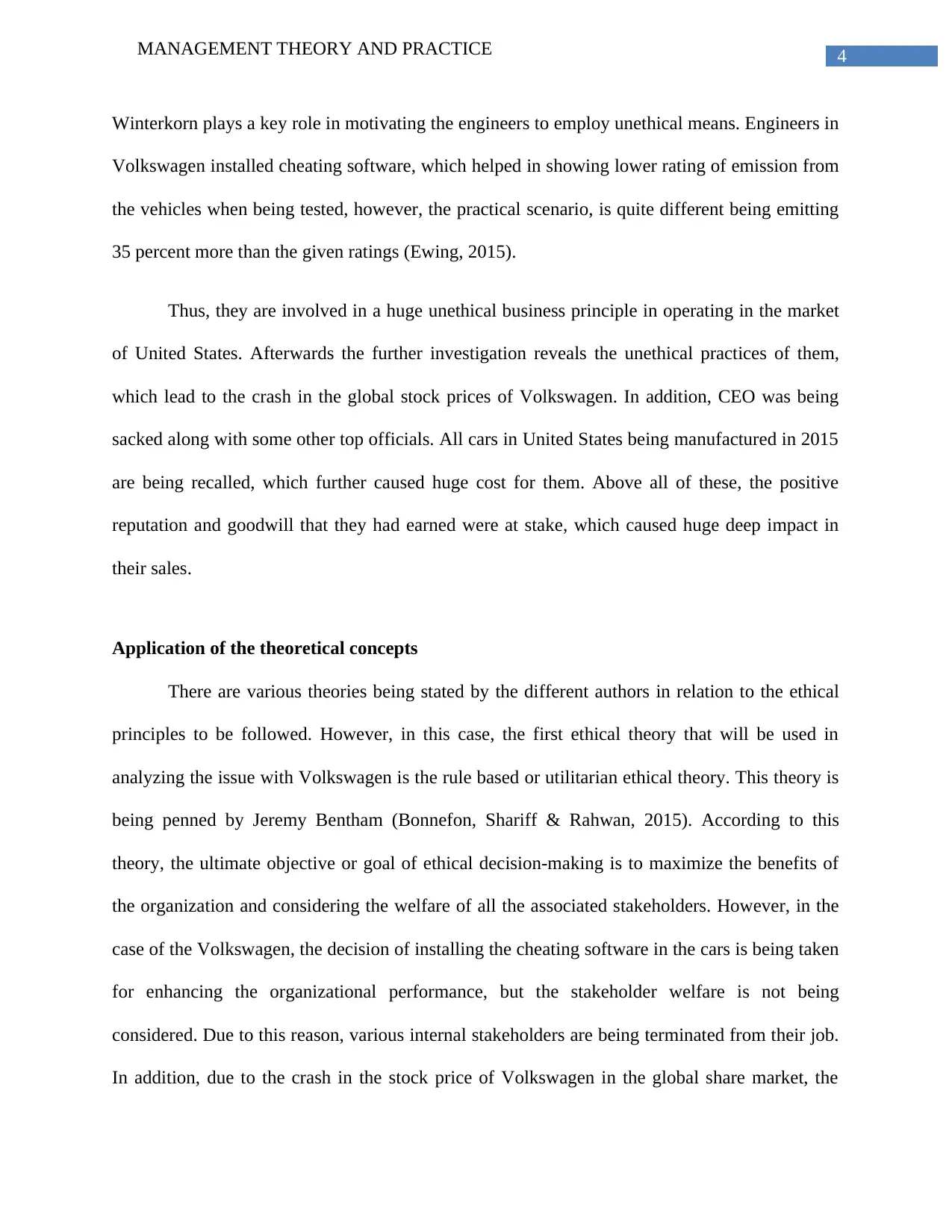
4MANAGEMENT THEORY AND PRACTICE
Winterkorn plays a key role in motivating the engineers to employ unethical means. Engineers in
Volkswagen installed cheating software, which helped in showing lower rating of emission from
the vehicles when being tested, however, the practical scenario, is quite different being emitting
35 percent more than the given ratings (Ewing, 2015).
Thus, they are involved in a huge unethical business principle in operating in the market
of United States. Afterwards the further investigation reveals the unethical practices of them,
which lead to the crash in the global stock prices of Volkswagen. In addition, CEO was being
sacked along with some other top officials. All cars in United States being manufactured in 2015
are being recalled, which further caused huge cost for them. Above all of these, the positive
reputation and goodwill that they had earned were at stake, which caused huge deep impact in
their sales.
Application of the theoretical concepts
There are various theories being stated by the different authors in relation to the ethical
principles to be followed. However, in this case, the first ethical theory that will be used in
analyzing the issue with Volkswagen is the rule based or utilitarian ethical theory. This theory is
being penned by Jeremy Bentham (Bonnefon, Shariff & Rahwan, 2015). According to this
theory, the ultimate objective or goal of ethical decision-making is to maximize the benefits of
the organization and considering the welfare of all the associated stakeholders. However, in the
case of the Volkswagen, the decision of installing the cheating software in the cars is being taken
for enhancing the organizational performance, but the stakeholder welfare is not being
considered. Due to this reason, various internal stakeholders are being terminated from their job.
In addition, due to the crash in the stock price of Volkswagen in the global share market, the
Winterkorn plays a key role in motivating the engineers to employ unethical means. Engineers in
Volkswagen installed cheating software, which helped in showing lower rating of emission from
the vehicles when being tested, however, the practical scenario, is quite different being emitting
35 percent more than the given ratings (Ewing, 2015).
Thus, they are involved in a huge unethical business principle in operating in the market
of United States. Afterwards the further investigation reveals the unethical practices of them,
which lead to the crash in the global stock prices of Volkswagen. In addition, CEO was being
sacked along with some other top officials. All cars in United States being manufactured in 2015
are being recalled, which further caused huge cost for them. Above all of these, the positive
reputation and goodwill that they had earned were at stake, which caused huge deep impact in
their sales.
Application of the theoretical concepts
There are various theories being stated by the different authors in relation to the ethical
principles to be followed. However, in this case, the first ethical theory that will be used in
analyzing the issue with Volkswagen is the rule based or utilitarian ethical theory. This theory is
being penned by Jeremy Bentham (Bonnefon, Shariff & Rahwan, 2015). According to this
theory, the ultimate objective or goal of ethical decision-making is to maximize the benefits of
the organization and considering the welfare of all the associated stakeholders. However, in the
case of the Volkswagen, the decision of installing the cheating software in the cars is being taken
for enhancing the organizational performance, but the stakeholder welfare is not being
considered. Due to this reason, various internal stakeholders are being terminated from their job.
In addition, due to the crash in the stock price of Volkswagen in the global share market, the
Paraphrase This Document
Need a fresh take? Get an instant paraphrase of this document with our AI Paraphraser
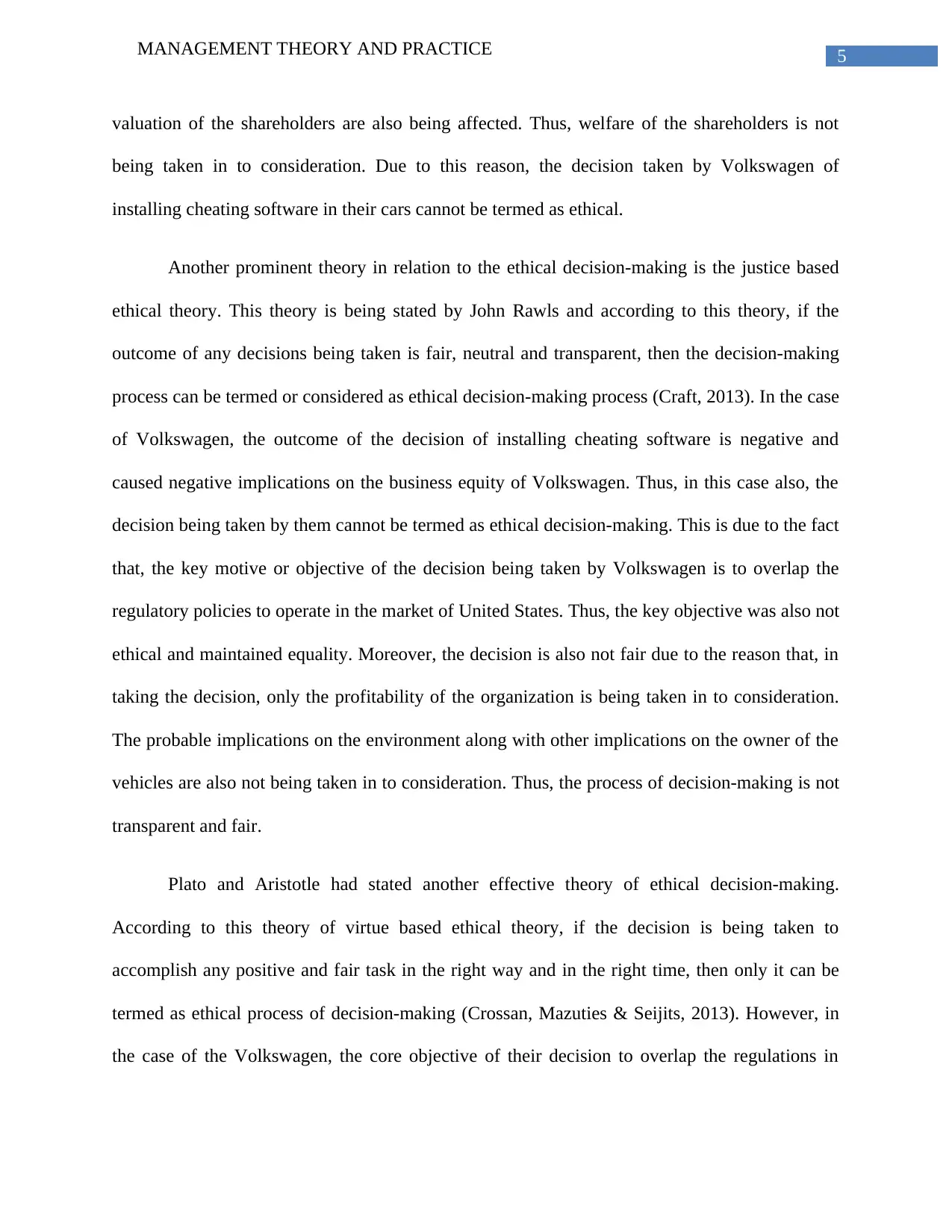
5MANAGEMENT THEORY AND PRACTICE
valuation of the shareholders are also being affected. Thus, welfare of the shareholders is not
being taken in to consideration. Due to this reason, the decision taken by Volkswagen of
installing cheating software in their cars cannot be termed as ethical.
Another prominent theory in relation to the ethical decision-making is the justice based
ethical theory. This theory is being stated by John Rawls and according to this theory, if the
outcome of any decisions being taken is fair, neutral and transparent, then the decision-making
process can be termed or considered as ethical decision-making process (Craft, 2013). In the case
of Volkswagen, the outcome of the decision of installing cheating software is negative and
caused negative implications on the business equity of Volkswagen. Thus, in this case also, the
decision being taken by them cannot be termed as ethical decision-making. This is due to the fact
that, the key motive or objective of the decision being taken by Volkswagen is to overlap the
regulatory policies to operate in the market of United States. Thus, the key objective was also not
ethical and maintained equality. Moreover, the decision is also not fair due to the reason that, in
taking the decision, only the profitability of the organization is being taken in to consideration.
The probable implications on the environment along with other implications on the owner of the
vehicles are also not being taken in to consideration. Thus, the process of decision-making is not
transparent and fair.
Plato and Aristotle had stated another effective theory of ethical decision-making.
According to this theory of virtue based ethical theory, if the decision is being taken to
accomplish any positive and fair task in the right way and in the right time, then only it can be
termed as ethical process of decision-making (Crossan, Mazuties & Seijits, 2013). However, in
the case of the Volkswagen, the core objective of their decision to overlap the regulations in
valuation of the shareholders are also being affected. Thus, welfare of the shareholders is not
being taken in to consideration. Due to this reason, the decision taken by Volkswagen of
installing cheating software in their cars cannot be termed as ethical.
Another prominent theory in relation to the ethical decision-making is the justice based
ethical theory. This theory is being stated by John Rawls and according to this theory, if the
outcome of any decisions being taken is fair, neutral and transparent, then the decision-making
process can be termed or considered as ethical decision-making process (Craft, 2013). In the case
of Volkswagen, the outcome of the decision of installing cheating software is negative and
caused negative implications on the business equity of Volkswagen. Thus, in this case also, the
decision being taken by them cannot be termed as ethical decision-making. This is due to the fact
that, the key motive or objective of the decision being taken by Volkswagen is to overlap the
regulatory policies to operate in the market of United States. Thus, the key objective was also not
ethical and maintained equality. Moreover, the decision is also not fair due to the reason that, in
taking the decision, only the profitability of the organization is being taken in to consideration.
The probable implications on the environment along with other implications on the owner of the
vehicles are also not being taken in to consideration. Thus, the process of decision-making is not
transparent and fair.
Plato and Aristotle had stated another effective theory of ethical decision-making.
According to this theory of virtue based ethical theory, if the decision is being taken to
accomplish any positive and fair task in the right way and in the right time, then only it can be
termed as ethical process of decision-making (Crossan, Mazuties & Seijits, 2013). However, in
the case of the Volkswagen, the core objective of their decision to overlap the regulations in
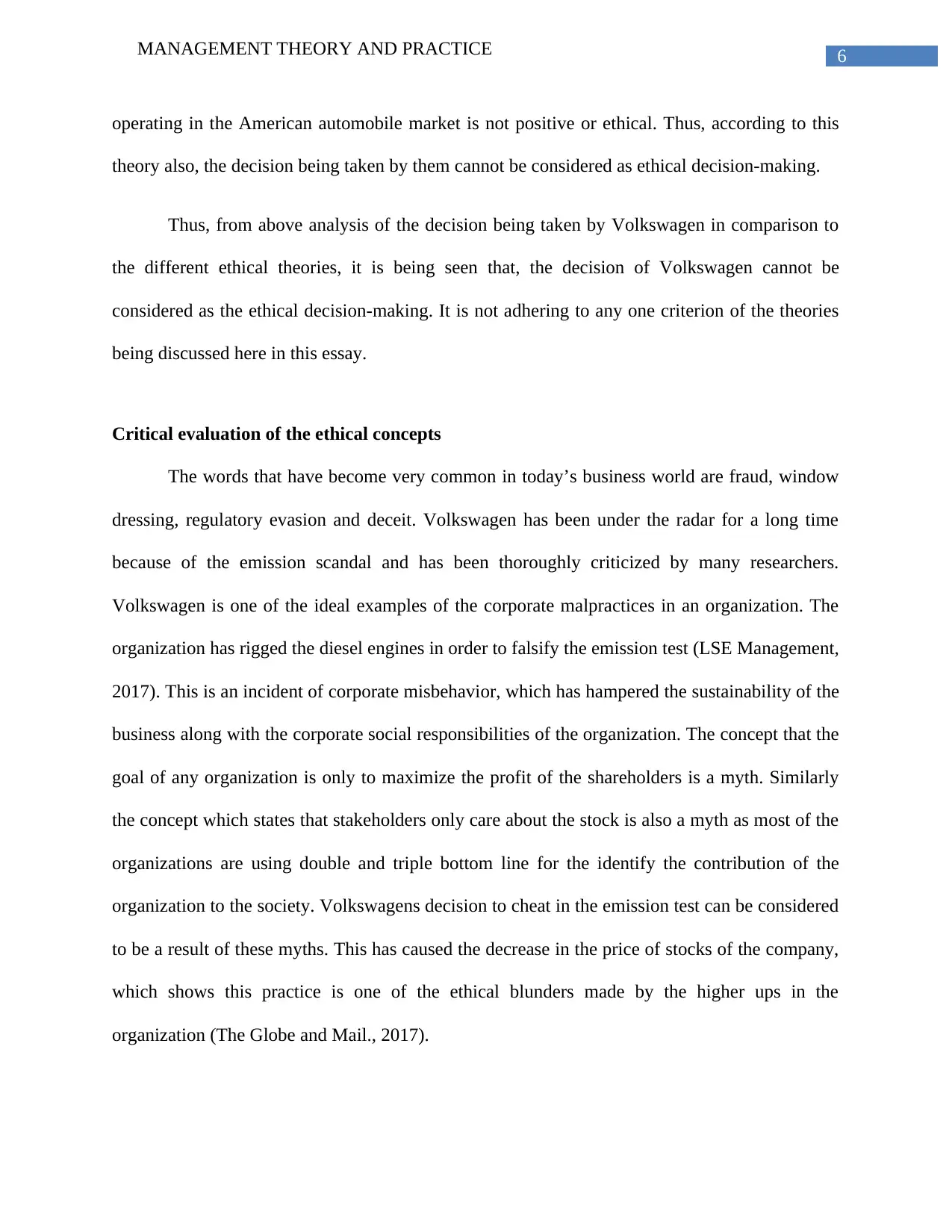
6MANAGEMENT THEORY AND PRACTICE
operating in the American automobile market is not positive or ethical. Thus, according to this
theory also, the decision being taken by them cannot be considered as ethical decision-making.
Thus, from above analysis of the decision being taken by Volkswagen in comparison to
the different ethical theories, it is being seen that, the decision of Volkswagen cannot be
considered as the ethical decision-making. It is not adhering to any one criterion of the theories
being discussed here in this essay.
Critical evaluation of the ethical concepts
The words that have become very common in today’s business world are fraud, window
dressing, regulatory evasion and deceit. Volkswagen has been under the radar for a long time
because of the emission scandal and has been thoroughly criticized by many researchers.
Volkswagen is one of the ideal examples of the corporate malpractices in an organization. The
organization has rigged the diesel engines in order to falsify the emission test (LSE Management,
2017). This is an incident of corporate misbehavior, which has hampered the sustainability of the
business along with the corporate social responsibilities of the organization. The concept that the
goal of any organization is only to maximize the profit of the shareholders is a myth. Similarly
the concept which states that stakeholders only care about the stock is also a myth as most of the
organizations are using double and triple bottom line for the identify the contribution of the
organization to the society. Volkswagens decision to cheat in the emission test can be considered
to be a result of these myths. This has caused the decrease in the price of stocks of the company,
which shows this practice is one of the ethical blunders made by the higher ups in the
organization (The Globe and Mail., 2017).
operating in the American automobile market is not positive or ethical. Thus, according to this
theory also, the decision being taken by them cannot be considered as ethical decision-making.
Thus, from above analysis of the decision being taken by Volkswagen in comparison to
the different ethical theories, it is being seen that, the decision of Volkswagen cannot be
considered as the ethical decision-making. It is not adhering to any one criterion of the theories
being discussed here in this essay.
Critical evaluation of the ethical concepts
The words that have become very common in today’s business world are fraud, window
dressing, regulatory evasion and deceit. Volkswagen has been under the radar for a long time
because of the emission scandal and has been thoroughly criticized by many researchers.
Volkswagen is one of the ideal examples of the corporate malpractices in an organization. The
organization has rigged the diesel engines in order to falsify the emission test (LSE Management,
2017). This is an incident of corporate misbehavior, which has hampered the sustainability of the
business along with the corporate social responsibilities of the organization. The concept that the
goal of any organization is only to maximize the profit of the shareholders is a myth. Similarly
the concept which states that stakeholders only care about the stock is also a myth as most of the
organizations are using double and triple bottom line for the identify the contribution of the
organization to the society. Volkswagens decision to cheat in the emission test can be considered
to be a result of these myths. This has caused the decrease in the price of stocks of the company,
which shows this practice is one of the ethical blunders made by the higher ups in the
organization (The Globe and Mail., 2017).
⊘ This is a preview!⊘
Do you want full access?
Subscribe today to unlock all pages.

Trusted by 1+ million students worldwide
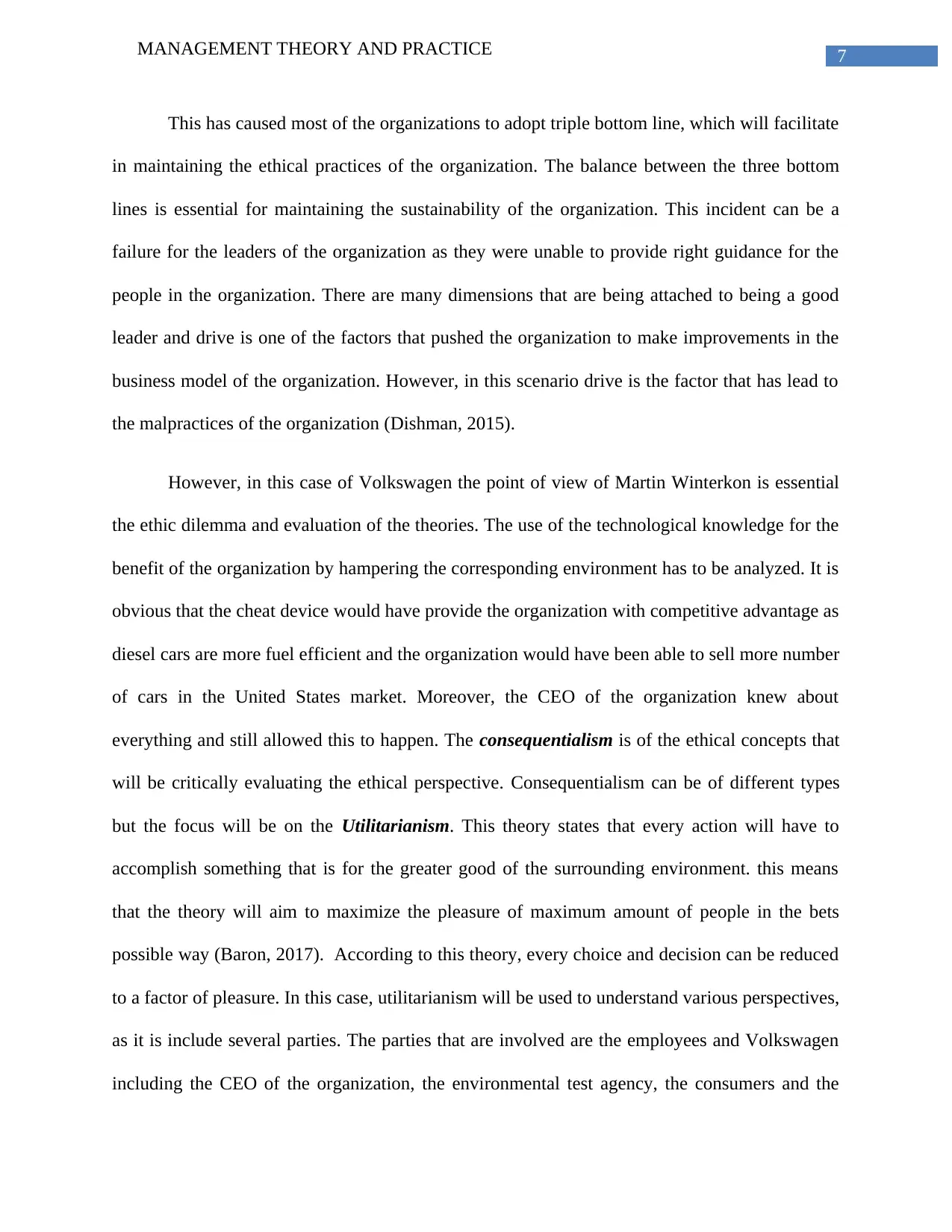
7MANAGEMENT THEORY AND PRACTICE
This has caused most of the organizations to adopt triple bottom line, which will facilitate
in maintaining the ethical practices of the organization. The balance between the three bottom
lines is essential for maintaining the sustainability of the organization. This incident can be a
failure for the leaders of the organization as they were unable to provide right guidance for the
people in the organization. There are many dimensions that are being attached to being a good
leader and drive is one of the factors that pushed the organization to make improvements in the
business model of the organization. However, in this scenario drive is the factor that has lead to
the malpractices of the organization (Dishman, 2015).
However, in this case of Volkswagen the point of view of Martin Winterkon is essential
the ethic dilemma and evaluation of the theories. The use of the technological knowledge for the
benefit of the organization by hampering the corresponding environment has to be analyzed. It is
obvious that the cheat device would have provide the organization with competitive advantage as
diesel cars are more fuel efficient and the organization would have been able to sell more number
of cars in the United States market. Moreover, the CEO of the organization knew about
everything and still allowed this to happen. The consequentialism is of the ethical concepts that
will be critically evaluating the ethical perspective. Consequentialism can be of different types
but the focus will be on the Utilitarianism. This theory states that every action will have to
accomplish something that is for the greater good of the surrounding environment. this means
that the theory will aim to maximize the pleasure of maximum amount of people in the bets
possible way (Baron, 2017). According to this theory, every choice and decision can be reduced
to a factor of pleasure. In this case, utilitarianism will be used to understand various perspectives,
as it is include several parties. The parties that are involved are the employees and Volkswagen
including the CEO of the organization, the environmental test agency, the consumers and the
This has caused most of the organizations to adopt triple bottom line, which will facilitate
in maintaining the ethical practices of the organization. The balance between the three bottom
lines is essential for maintaining the sustainability of the organization. This incident can be a
failure for the leaders of the organization as they were unable to provide right guidance for the
people in the organization. There are many dimensions that are being attached to being a good
leader and drive is one of the factors that pushed the organization to make improvements in the
business model of the organization. However, in this scenario drive is the factor that has lead to
the malpractices of the organization (Dishman, 2015).
However, in this case of Volkswagen the point of view of Martin Winterkon is essential
the ethic dilemma and evaluation of the theories. The use of the technological knowledge for the
benefit of the organization by hampering the corresponding environment has to be analyzed. It is
obvious that the cheat device would have provide the organization with competitive advantage as
diesel cars are more fuel efficient and the organization would have been able to sell more number
of cars in the United States market. Moreover, the CEO of the organization knew about
everything and still allowed this to happen. The consequentialism is of the ethical concepts that
will be critically evaluating the ethical perspective. Consequentialism can be of different types
but the focus will be on the Utilitarianism. This theory states that every action will have to
accomplish something that is for the greater good of the surrounding environment. this means
that the theory will aim to maximize the pleasure of maximum amount of people in the bets
possible way (Baron, 2017). According to this theory, every choice and decision can be reduced
to a factor of pleasure. In this case, utilitarianism will be used to understand various perspectives,
as it is include several parties. The parties that are involved are the employees and Volkswagen
including the CEO of the organization, the environmental test agency, the consumers and the
Paraphrase This Document
Need a fresh take? Get an instant paraphrase of this document with our AI Paraphraser
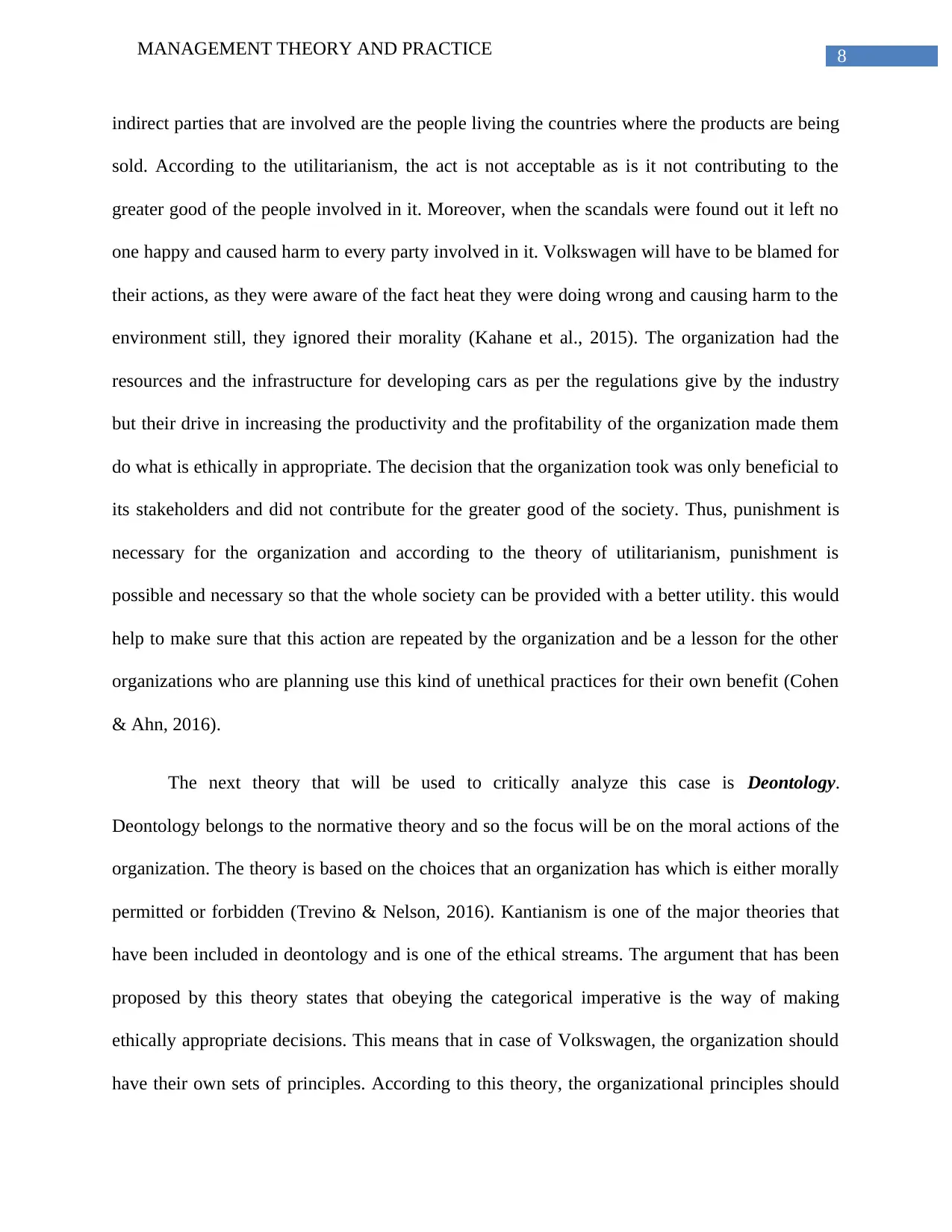
8MANAGEMENT THEORY AND PRACTICE
indirect parties that are involved are the people living the countries where the products are being
sold. According to the utilitarianism, the act is not acceptable as is it not contributing to the
greater good of the people involved in it. Moreover, when the scandals were found out it left no
one happy and caused harm to every party involved in it. Volkswagen will have to be blamed for
their actions, as they were aware of the fact heat they were doing wrong and causing harm to the
environment still, they ignored their morality (Kahane et al., 2015). The organization had the
resources and the infrastructure for developing cars as per the regulations give by the industry
but their drive in increasing the productivity and the profitability of the organization made them
do what is ethically in appropriate. The decision that the organization took was only beneficial to
its stakeholders and did not contribute for the greater good of the society. Thus, punishment is
necessary for the organization and according to the theory of utilitarianism, punishment is
possible and necessary so that the whole society can be provided with a better utility. this would
help to make sure that this action are repeated by the organization and be a lesson for the other
organizations who are planning use this kind of unethical practices for their own benefit (Cohen
& Ahn, 2016).
The next theory that will be used to critically analyze this case is Deontology.
Deontology belongs to the normative theory and so the focus will be on the moral actions of the
organization. The theory is based on the choices that an organization has which is either morally
permitted or forbidden (Trevino & Nelson, 2016). Kantianism is one of the major theories that
have been included in deontology and is one of the ethical streams. The argument that has been
proposed by this theory states that obeying the categorical imperative is the way of making
ethically appropriate decisions. This means that in case of Volkswagen, the organization should
have their own sets of principles. According to this theory, the organizational principles should
indirect parties that are involved are the people living the countries where the products are being
sold. According to the utilitarianism, the act is not acceptable as is it not contributing to the
greater good of the people involved in it. Moreover, when the scandals were found out it left no
one happy and caused harm to every party involved in it. Volkswagen will have to be blamed for
their actions, as they were aware of the fact heat they were doing wrong and causing harm to the
environment still, they ignored their morality (Kahane et al., 2015). The organization had the
resources and the infrastructure for developing cars as per the regulations give by the industry
but their drive in increasing the productivity and the profitability of the organization made them
do what is ethically in appropriate. The decision that the organization took was only beneficial to
its stakeholders and did not contribute for the greater good of the society. Thus, punishment is
necessary for the organization and according to the theory of utilitarianism, punishment is
possible and necessary so that the whole society can be provided with a better utility. this would
help to make sure that this action are repeated by the organization and be a lesson for the other
organizations who are planning use this kind of unethical practices for their own benefit (Cohen
& Ahn, 2016).
The next theory that will be used to critically analyze this case is Deontology.
Deontology belongs to the normative theory and so the focus will be on the moral actions of the
organization. The theory is based on the choices that an organization has which is either morally
permitted or forbidden (Trevino & Nelson, 2016). Kantianism is one of the major theories that
have been included in deontology and is one of the ethical streams. The argument that has been
proposed by this theory states that obeying the categorical imperative is the way of making
ethically appropriate decisions. This means that in case of Volkswagen, the organization should
have their own sets of principles. According to this theory, the organizational principles should
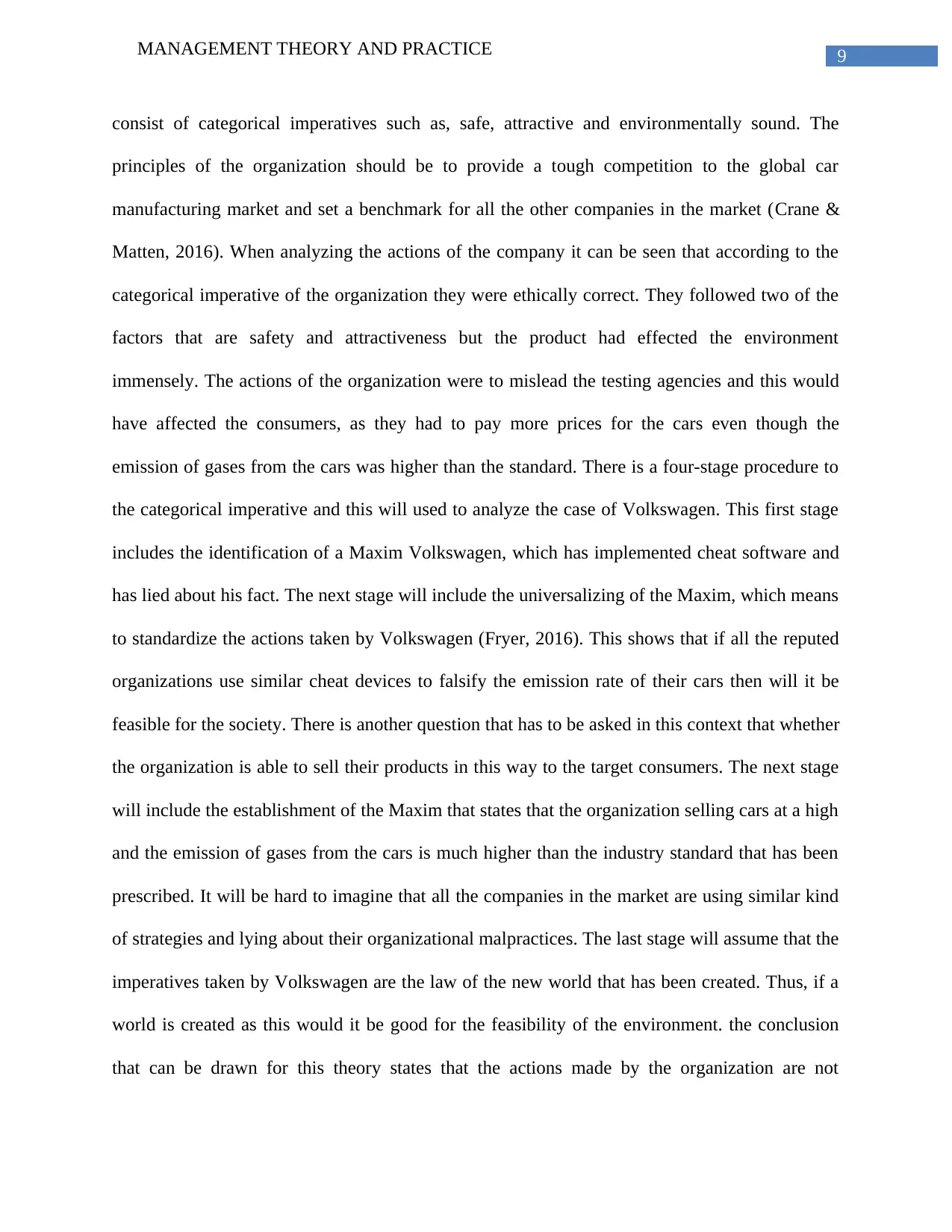
9MANAGEMENT THEORY AND PRACTICE
consist of categorical imperatives such as, safe, attractive and environmentally sound. The
principles of the organization should be to provide a tough competition to the global car
manufacturing market and set a benchmark for all the other companies in the market (Crane &
Matten, 2016). When analyzing the actions of the company it can be seen that according to the
categorical imperative of the organization they were ethically correct. They followed two of the
factors that are safety and attractiveness but the product had effected the environment
immensely. The actions of the organization were to mislead the testing agencies and this would
have affected the consumers, as they had to pay more prices for the cars even though the
emission of gases from the cars was higher than the standard. There is a four-stage procedure to
the categorical imperative and this will used to analyze the case of Volkswagen. This first stage
includes the identification of a Maxim Volkswagen, which has implemented cheat software and
has lied about his fact. The next stage will include the universalizing of the Maxim, which means
to standardize the actions taken by Volkswagen (Fryer, 2016). This shows that if all the reputed
organizations use similar cheat devices to falsify the emission rate of their cars then will it be
feasible for the society. There is another question that has to be asked in this context that whether
the organization is able to sell their products in this way to the target consumers. The next stage
will include the establishment of the Maxim that states that the organization selling cars at a high
and the emission of gases from the cars is much higher than the industry standard that has been
prescribed. It will be hard to imagine that all the companies in the market are using similar kind
of strategies and lying about their organizational malpractices. The last stage will assume that the
imperatives taken by Volkswagen are the law of the new world that has been created. Thus, if a
world is created as this would it be good for the feasibility of the environment. the conclusion
that can be drawn for this theory states that the actions made by the organization are not
consist of categorical imperatives such as, safe, attractive and environmentally sound. The
principles of the organization should be to provide a tough competition to the global car
manufacturing market and set a benchmark for all the other companies in the market (Crane &
Matten, 2016). When analyzing the actions of the company it can be seen that according to the
categorical imperative of the organization they were ethically correct. They followed two of the
factors that are safety and attractiveness but the product had effected the environment
immensely. The actions of the organization were to mislead the testing agencies and this would
have affected the consumers, as they had to pay more prices for the cars even though the
emission of gases from the cars was higher than the standard. There is a four-stage procedure to
the categorical imperative and this will used to analyze the case of Volkswagen. This first stage
includes the identification of a Maxim Volkswagen, which has implemented cheat software and
has lied about his fact. The next stage will include the universalizing of the Maxim, which means
to standardize the actions taken by Volkswagen (Fryer, 2016). This shows that if all the reputed
organizations use similar cheat devices to falsify the emission rate of their cars then will it be
feasible for the society. There is another question that has to be asked in this context that whether
the organization is able to sell their products in this way to the target consumers. The next stage
will include the establishment of the Maxim that states that the organization selling cars at a high
and the emission of gases from the cars is much higher than the industry standard that has been
prescribed. It will be hard to imagine that all the companies in the market are using similar kind
of strategies and lying about their organizational malpractices. The last stage will assume that the
imperatives taken by Volkswagen are the law of the new world that has been created. Thus, if a
world is created as this would it be good for the feasibility of the environment. the conclusion
that can be drawn for this theory states that the actions made by the organization are not
⊘ This is a preview!⊘
Do you want full access?
Subscribe today to unlock all pages.

Trusted by 1+ million students worldwide
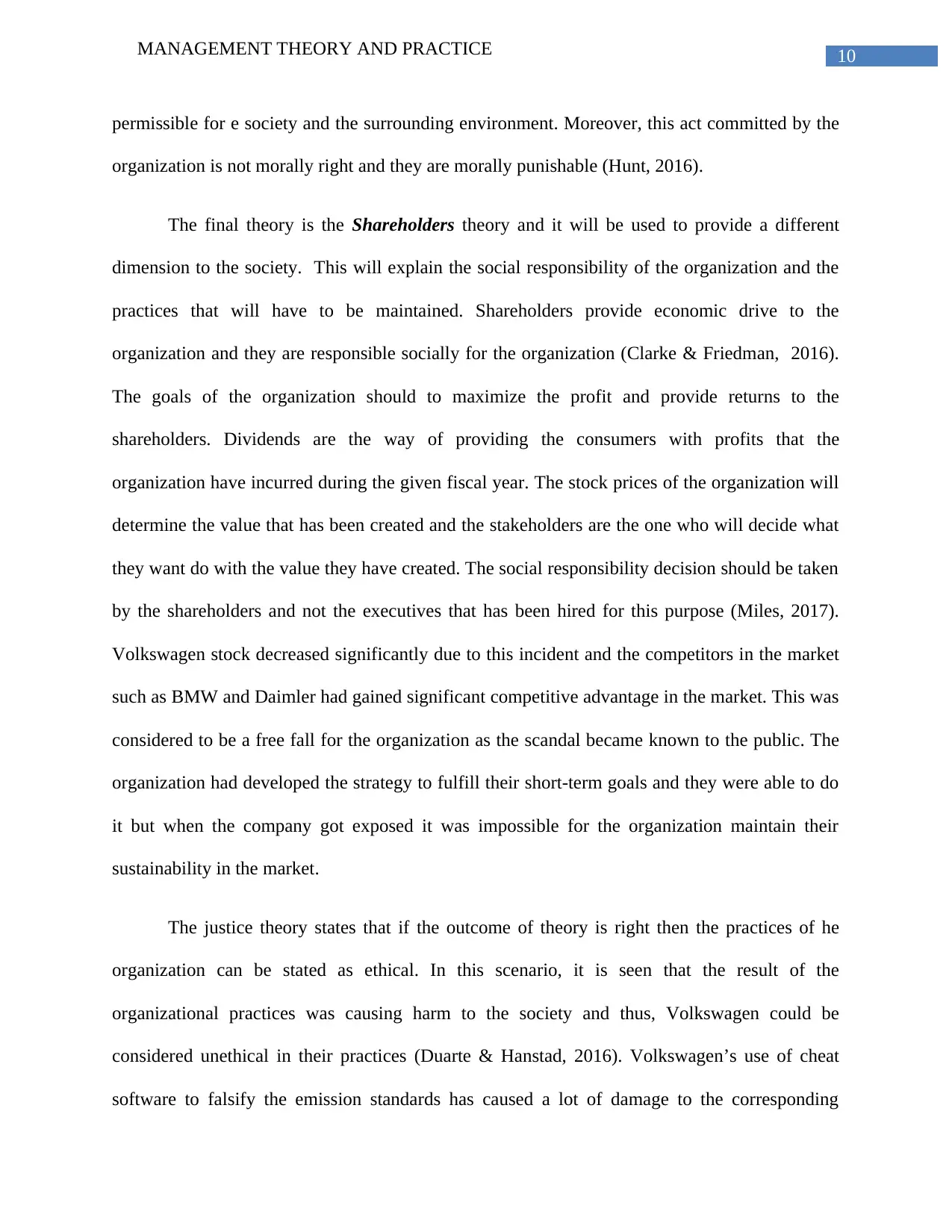
10MANAGEMENT THEORY AND PRACTICE
permissible for e society and the surrounding environment. Moreover, this act committed by the
organization is not morally right and they are morally punishable (Hunt, 2016).
The final theory is the Shareholders theory and it will be used to provide a different
dimension to the society. This will explain the social responsibility of the organization and the
practices that will have to be maintained. Shareholders provide economic drive to the
organization and they are responsible socially for the organization (Clarke & Friedman, 2016).
The goals of the organization should to maximize the profit and provide returns to the
shareholders. Dividends are the way of providing the consumers with profits that the
organization have incurred during the given fiscal year. The stock prices of the organization will
determine the value that has been created and the stakeholders are the one who will decide what
they want do with the value they have created. The social responsibility decision should be taken
by the shareholders and not the executives that has been hired for this purpose (Miles, 2017).
Volkswagen stock decreased significantly due to this incident and the competitors in the market
such as BMW and Daimler had gained significant competitive advantage in the market. This was
considered to be a free fall for the organization as the scandal became known to the public. The
organization had developed the strategy to fulfill their short-term goals and they were able to do
it but when the company got exposed it was impossible for the organization maintain their
sustainability in the market.
The justice theory states that if the outcome of theory is right then the practices of he
organization can be stated as ethical. In this scenario, it is seen that the result of the
organizational practices was causing harm to the society and thus, Volkswagen could be
considered unethical in their practices (Duarte & Hanstad, 2016). Volkswagen’s use of cheat
software to falsify the emission standards has caused a lot of damage to the corresponding
permissible for e society and the surrounding environment. Moreover, this act committed by the
organization is not morally right and they are morally punishable (Hunt, 2016).
The final theory is the Shareholders theory and it will be used to provide a different
dimension to the society. This will explain the social responsibility of the organization and the
practices that will have to be maintained. Shareholders provide economic drive to the
organization and they are responsible socially for the organization (Clarke & Friedman, 2016).
The goals of the organization should to maximize the profit and provide returns to the
shareholders. Dividends are the way of providing the consumers with profits that the
organization have incurred during the given fiscal year. The stock prices of the organization will
determine the value that has been created and the stakeholders are the one who will decide what
they want do with the value they have created. The social responsibility decision should be taken
by the shareholders and not the executives that has been hired for this purpose (Miles, 2017).
Volkswagen stock decreased significantly due to this incident and the competitors in the market
such as BMW and Daimler had gained significant competitive advantage in the market. This was
considered to be a free fall for the organization as the scandal became known to the public. The
organization had developed the strategy to fulfill their short-term goals and they were able to do
it but when the company got exposed it was impossible for the organization maintain their
sustainability in the market.
The justice theory states that if the outcome of theory is right then the practices of he
organization can be stated as ethical. In this scenario, it is seen that the result of the
organizational practices was causing harm to the society and thus, Volkswagen could be
considered unethical in their practices (Duarte & Hanstad, 2016). Volkswagen’s use of cheat
software to falsify the emission standards has caused a lot of damage to the corresponding
Paraphrase This Document
Need a fresh take? Get an instant paraphrase of this document with our AI Paraphraser
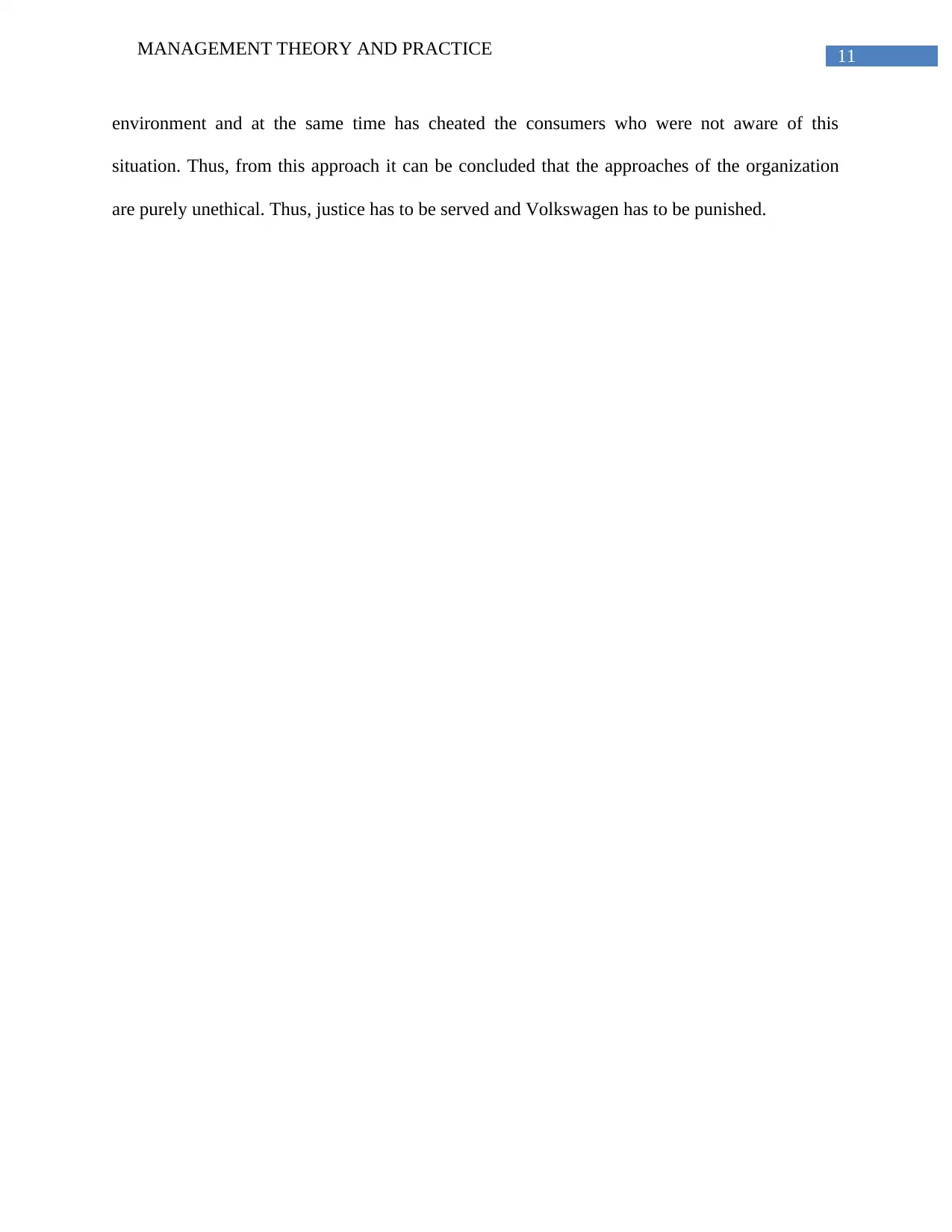
11MANAGEMENT THEORY AND PRACTICE
environment and at the same time has cheated the consumers who were not aware of this
situation. Thus, from this approach it can be concluded that the approaches of the organization
are purely unethical. Thus, justice has to be served and Volkswagen has to be punished.
environment and at the same time has cheated the consumers who were not aware of this
situation. Thus, from this approach it can be concluded that the approaches of the organization
are purely unethical. Thus, justice has to be served and Volkswagen has to be punished.
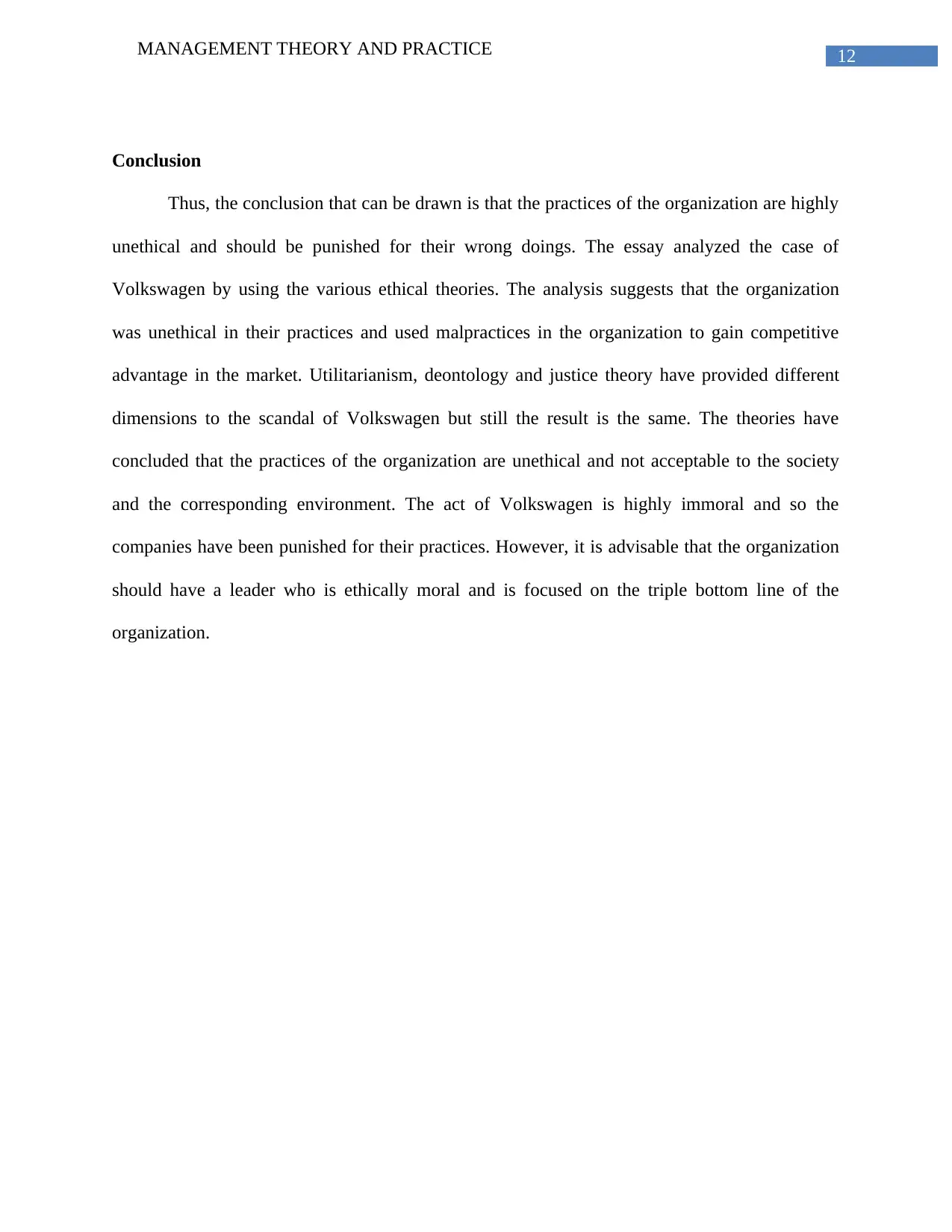
12MANAGEMENT THEORY AND PRACTICE
Conclusion
Thus, the conclusion that can be drawn is that the practices of the organization are highly
unethical and should be punished for their wrong doings. The essay analyzed the case of
Volkswagen by using the various ethical theories. The analysis suggests that the organization
was unethical in their practices and used malpractices in the organization to gain competitive
advantage in the market. Utilitarianism, deontology and justice theory have provided different
dimensions to the scandal of Volkswagen but still the result is the same. The theories have
concluded that the practices of the organization are unethical and not acceptable to the society
and the corresponding environment. The act of Volkswagen is highly immoral and so the
companies have been punished for their practices. However, it is advisable that the organization
should have a leader who is ethically moral and is focused on the triple bottom line of the
organization.
Conclusion
Thus, the conclusion that can be drawn is that the practices of the organization are highly
unethical and should be punished for their wrong doings. The essay analyzed the case of
Volkswagen by using the various ethical theories. The analysis suggests that the organization
was unethical in their practices and used malpractices in the organization to gain competitive
advantage in the market. Utilitarianism, deontology and justice theory have provided different
dimensions to the scandal of Volkswagen but still the result is the same. The theories have
concluded that the practices of the organization are unethical and not acceptable to the society
and the corresponding environment. The act of Volkswagen is highly immoral and so the
companies have been punished for their practices. However, it is advisable that the organization
should have a leader who is ethically moral and is focused on the triple bottom line of the
organization.
⊘ This is a preview!⊘
Do you want full access?
Subscribe today to unlock all pages.

Trusted by 1+ million students worldwide
1 out of 15
Related Documents
Your All-in-One AI-Powered Toolkit for Academic Success.
+13062052269
info@desklib.com
Available 24*7 on WhatsApp / Email
![[object Object]](/_next/static/media/star-bottom.7253800d.svg)
Unlock your academic potential
Copyright © 2020–2026 A2Z Services. All Rights Reserved. Developed and managed by ZUCOL.




